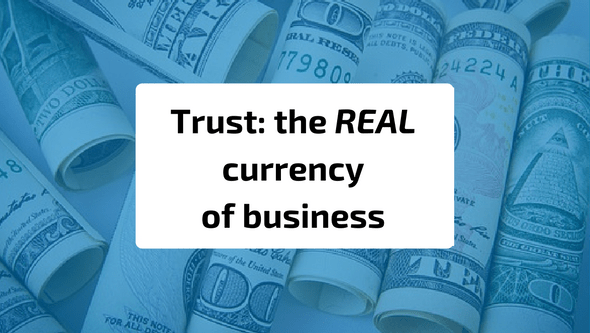
If you ask most people what the currency of business is, they will say the U.S. dollar, the British pound, or the Chinese renminbi. On the surface, that would be correct, but in reality, no matter what country you live in, the fundamental currency of business is trust.
Even in countries with highly functioning justice systems to protect their interests, people will tend not to do business with individuals and companies they do not trust. Countless articles and studies demonstrate how trust is more important in determining who we do business with than price or any other factor. [Harvard Business Review Articles: https://hbr.org/2014/03/who-can-you-trust & https://hbr.org/2006/09/the-decision-to-trust]
So, if trust is the fundamental capital of business, what is it made of? Why is it so powerful? And how do we earn it? In this piece, I’m going to focus on answering the first two questions, and I’ll address gaining and losing trust in subsequent blogs.
What is trust made of?
The dictionary definition of trust is “firm belief in the reliability, truth, ability or strength of someone or something.” That’s a good first step toward understanding what trust is, but to really grasp why it’s such powerful driver in business, you have to dig deeper.
Recently, I saw a post on LinkedIn that struck me as an elegant deconstruction of the components of trust. In a less elegant maneuver on my part, I forgot to bookmark the post. Thus, I had to reconstruct the matrix from memory and, unfortunately, I am unable to provide attribution. Nonetheless, this version should serve our purpose:

The key to understanding trust’s powerful effect on our decisions and behaviors lies in recognizing that trust has two primary components: character and competence. To earn someone’s trust, an individual must exhibit both of these qualities.
Character is defined by your intent (heartfelt purpose) and your integrity (doing what you say you’re going to do).
Competence is defined by your capability (ability to perform) and your results (track record of performance).
Both character and competence are equally important in evaluating who you can trust. After all, if someone has the competence to do what you need but falls short on character (for instance, by not having the integrity to actually follow through), his or her sterling competence is essentially useless.
Unconvinced? Consider this: Even if you trust someone’s competence, things may still go wrong. Everyone makes mistakes, and it’s then that elements such as transparency, openness, honesty and authenticity come into play. Making things right (or putting in every effort to do so) is a critical measure of character.
Why is trust so powerful?
You have clients who trust you, just as you trust your own business partners and vendors. If you don’t trust someone with whom you embark on a professional relationship – or if you lose trust in that person along the road – chances are good that the relationship won’t last.
For this reason, people typically prefer to do business with individuals and organizations they trust, even if that means paying more money. From this perspective, trust is a much more valuable and powerful currency than cold, hard cash.
 Byron Attridge, Sales Consultant
Byron Attridge, Sales Consultant
The purpose of this blog is to answer the questions you ask! Feel free to contact us– we love discussing our business stance and managed services! You can also learn more about our business practices by checking out related posts!



